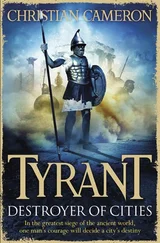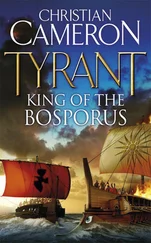Christian Cameron - Washington and Caesar
Здесь есть возможность читать онлайн «Christian Cameron - Washington and Caesar» — ознакомительный отрывок электронной книги совершенно бесплатно, а после прочтения отрывка купить полную версию. В некоторых случаях можно слушать аудио, скачать через торрент в формате fb2 и присутствует краткое содержание. Год выпуска: 0101, ISBN: 0101, Издательство: HarperCollins, Жанр: Исторические приключения, на английском языке. Описание произведения, (предисловие) а так же отзывы посетителей доступны на портале библиотеки ЛибКат.
- Название:Washington and Caesar
- Автор:
- Издательство:HarperCollins
- Жанр:
- Год:0101
- ISBN:9780007389698
- Рейтинг книги:3 / 5. Голосов: 1
-
Избранное:Добавить в избранное
- Отзывы:
-
Ваша оценка:
- 60
- 1
- 2
- 3
- 4
- 5
Washington and Caesar: краткое содержание, описание и аннотация
Предлагаем к чтению аннотацию, описание, краткое содержание или предисловие (зависит от того, что написал сам автор книги «Washington and Caesar»). Если вы не нашли необходимую информацию о книге — напишите в комментариях, мы постараемся отыскать её.
Washington and Caesar — читать онлайн ознакомительный отрывок
Ниже представлен текст книги, разбитый по страницам. Система сохранения места последней прочитанной страницы, позволяет с удобством читать онлайн бесплатно книгу «Washington and Caesar», без необходимости каждый раз заново искать на чём Вы остановились. Поставьте закладку, и сможете в любой момент перейти на страницу, на которой закончили чтение.
Интервал:
Закладка:
Washington gave Billy a nod. Billy knew which things to unpack and buff up; the miniature from Adrienne de Lafayette, the scent from France, and Washington passed into his study. He couldn’t call for David Humphreys, who was barely able to walk, and he was determined to send his letter tonight. He went to the desk, rifled it for paper and had to cut a quill. All his pens were years dead. Then he had to mix ink from powder, which required the help of an unfamiliar scullery maid. Finally he had his materials to hand and he dashed off a letter to the commander of the Frederick County militia demanding that they turn out the next day to repair the roads.
Then he rose and caught sight of the bust of Frederick the Great on the bookcase by his desk. He looked around at all the busts, Alexander and Caesar and Charles, and he shook his head as a grown man does when confronted with the excesses of youth. The busts put him in mind of something, though, and when he entered his wife’s parlor he was holding his own copy of Muller’s treatise on artillery and siegecraft.
She was reading a novel by the fire, and he came and settled on an elegant chair that hadn’t been in the room when he left for the war.
She put her book aside carefully. “Is the continent safe, then?”
“As safe as my poor powers can make it. I had to order a repair to the roads. Our wagons would mire…”
“It is not just the roads that lack repair, my general.”
“Yes,” he said, falling in with her conversation. He knew what she was playing at, but he determined to act the part of the man. “Yes, the wall in Truro churchyard also needs repair.”
“I heard talk of gifts,” she said.
Washington rose and called for Billy, who brought them, gave him an odd look and left up the stairs. Washington had pounds of presents for her, because no French officer visited him without a gift for “Madame Washington”. He presented her with a selection of the best, along with a few that he had chosen himself in Philadelphia and the ride south. She began to open them, exclaiming softly over the scent and deriding the tastelessness of a gold snuffbox that must have cost as much as a good horse.
“Now everything is from France,” she said. “I confess to missing our English trifles.”
He brought out a final package from his pocket and she opened it and looked at him. It was a small etui, a collection of sewing tools in a plain sharkskin scabbard with severe silver mounts. She ran her hand over the shagreen, like polished pebbles set in leather, and clipped it to her housewife.
“We still get some English goods,” he said.
“You thought of me,” she said. Her eyes were moist, but she turned away. “You…”
“Yes, my dear?” Once the words were out he knew what she wanted. He hadn’t told her how long he would be home, and she was too proud to ask.
“I will have tomorrow here, alone. The next day my staff and the French staff will arrive, and we will have to entertain. On the twelfth, I’ll be gone.”
“Gone? Where are you going?”
“Down the Peninsula, Martha. Cornwallis is near Williamsburg. I hope to catch him with his back to the sea and make him surrender.”
“Would that win the war?”
He shook his head. “I no longer know.”
She nodded, tears running down her face and neck.
He rose and walked to the window. He saw movement on the lawn and was tempted to give her a moment alone and walk out to see his dogs. The pack would have been broken up, of course, but he thought of the slave, Caesar, and of hunts in the autumn and the feeling of anticipation, so like the feeling he had now. That put him in mind of slaves. He spoke without turning.
“Have we changed a great many slaves?”
“They ran.”
“Ran?”
“When Mr. Arnold’s army passed this way, and again when General Phillips was across the river. Each time the British came near, they flocked to join them.”
Washington looked through the window again. “Can you blame them?”
Martha rose from her chair and looked at him in mock horror. “Whoever you are, leave this house and tell my husband to return!”
He shook his head, laughing with her, and then caught a hand and kissed it. “I’m perfectly serious.”
Martha gave him that enigmatic smile and said, “I think it is time for supper. I wouldn’t want to keep the Generalissimo of the Continental Congress from his bed.” She stopped in the door and looked back at him, twenty years younger in the light. “Or mine.”
He bowed, happy, and made to follow her, but she stopped him with her fan.
“But you have changed.”
“I have, too.”
New York, October 1, 1781
The Loyal Americans had the outer posts on the White Plains road, and Caesar got to know them as he came out every day to wait for her return. She was supposed to go out with Mrs. Van Sluyt and return the next day. After the third day of waiting he kept very much to himself. The Guides had recently been ordered to clean streets in New York, a loathsome chore and too much like labor for any of them. They cleaned for a day and grumbled, but Caesar would have none of it. He was quiet, and very dangerous.
On the fourth day he stopped at the Whites’ lodging, finding neither father nor daughter. Then he walked out to the first line of posts, saluting officers and accepting the curious salutes of a variety of corps, and showed his pass, and then out alone through the dangerous ground between the first and second line, and so to the Loyal Americans again at sunset. He watched the road that led to Dobb’s Ferry and the rebel lines, but it was empty.
The green-coated men were quiet around him. They knew something was up. They knew he had been there when two black girls crossed the lines, and they knew that Sergeant Caesar was a favorite of their own colonel. So they nodded to him, stood stiffly in a post that was probably comfortable in better times, and wished him luck.
He watched until the sun went down, and then he picked his way back in the dark.
On the fifth day, a flag crossed the lines, and Caesar feared it, because if Polly had been taken he fancied that the rebels might announce it, but his real fear was far darker, because he feared Bludner. Sally had turned Bludner into a demon, and Caesar tried not to imagine her being made a slave, or raped, or killed for the man’s sport. He hated this game, and he wondered if he would forgive Marcus White his willingness to play it with his own daughter.
On the sixth day, the Loyal Americans had been replaced on the post by some of Emmerich’s men, a Loyalist regiment that included a fair number of rebel deserters, hard men, and in some cases very bad men. They were not so friendly, and they didn’t know him. They had a sergeant who seemed inclined to resent his presence. Caesar was too worried even to react to the slurs they passed casually, until he happened to look at the sergeant in just a certain way, and the sergeant withdrew, muttering. But although two parties of men passed the post, there were no women. It was a week until Sally’s messenger would return, and Polly was six days late, and Van Sluyt cried for his wife all day. Caesar knew he would have to resent the day labor soon, or do something to show that they were too useful to accept such treatment. But all he could think of was Polly.
On the seventh day, he had no duty. None of the Guides did. They were not in the posts, and the labor order had been withdrawn as mysteriously as it appeared. Caesar took Van Sluyt and walked out through the lines, showing his worn pass to every post and being greeted familiarly as he went. He had done this often now, and he was doing it more from superstition than from belief. He had begun to doubt Marcus White again. He couldn’t seem to interest Captain Stewart in the indignity of soldiers being made to labor-Stewart only said that his own men were building a road, and weren’t Caesar’s men getting extra pay? And Lieutenant Martin said the same. He felt as if he had to carry the concerns of every man and woman in the Guides, and he had to bear them while remaining outwardly unmoved by Polly’s absence. Too many people already knew too much. There were so many who could have betrayed her, and he wondered at Marcus White’s curious confidence that no black would betray another. He knew blacks in Jamaica who had sold dozens of their brothers into bondage, or back to bondage. He looked at the company at morning muster and wondered if one of them could have sold Polly to the rebels.
Читать дальшеИнтервал:
Закладка:
Похожие книги на «Washington and Caesar»
Представляем Вашему вниманию похожие книги на «Washington and Caesar» списком для выбора. Мы отобрали схожую по названию и смыслу литературу в надежде предоставить читателям больше вариантов отыскать новые, интересные, ещё непрочитанные произведения.
Обсуждение, отзывы о книге «Washington and Caesar» и просто собственные мнения читателей. Оставьте ваши комментарии, напишите, что Вы думаете о произведении, его смысле или главных героях. Укажите что конкретно понравилось, а что нет, и почему Вы так считаете.












